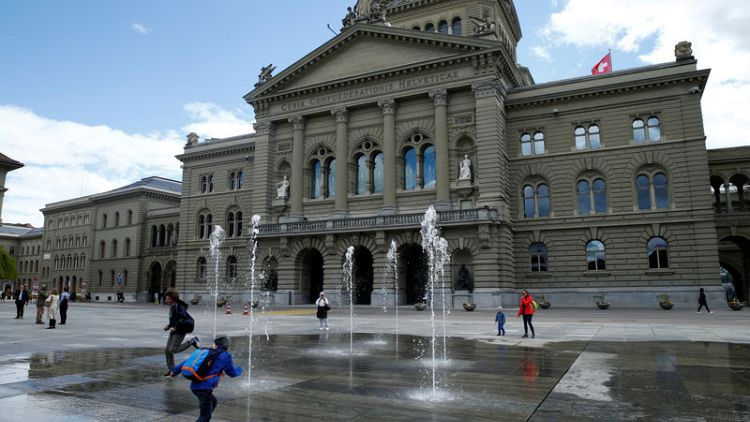By Michael Shields
ZURICH (Reuters) - Opposition from across the political spectrum will make it all but impossible for the Swiss government to sign a draft treaty with the European Union next month, sources close to the matter told Reuters.
Failure to sign the accord that Brussels has sought for a decade and which was negotiated over four years would plunge Swiss ties with its biggest trading partner into a new ice age, potentially disrupting trade and cross-border securities deals.
The Swiss cabinet will likely tell Brussels that too many points remain open to clinch a treaty deal now while it battles a far-right campaign to end the free movement of EU citizens in a referendum due next year, the sources said. That looming battle is being billed as Switzerland's Brexit moment.
With the treaty stalled for now, the European Commission has threatened not to extend beyond mid-2019 the recognition of Swiss stock exchange rules that lets EU investors make trades in Switzerland.
The Swiss medical technology sector could feel the pinch as Brussels drags its feet on updating mutual recognition of industrial standards in the sector, making exports harder. Swiss scientists could also be frozen out of EU research programmes if Europe plays hardball over Swiss footdragging on a pact.
The dangers are clear, but it is a price Swiss leaders appear ready to pay.
FIFTY SHADES OF NO
In the four-party, seven-member cabinet, only Foreign Minister Ignazio Cassis of the pro-business Liberals actively supports the deal, said one senior official from a coalition member. For the others, it is "fifty shades of no", this source said, seeking anonymity to discuss confidential deliberations.
The treaty would have non-EU member Switzerland routinely adopt EU single market rules and have EU citizens in Switzerland enjoy the same rights as in their homes countries. It would open the possibility of new trade deals, such as for an electricity union yoking Swiss and European utilities.
Opposition in Switzerland ranges from the far-right Swiss People's Party, which calls the treaty an unacceptable infringement of Swiss sovereignty, to the centre-left Social Democrats, who reject diluting Swiss rules that protect Europe's highest wages from cross-border competition.
The government has wrapped up months of consultations with domestic power brokers on how to proceed, and must give Brussels an answer next month.
The message is likely to be that Switzerland will keep working on a treaty but that its top priority is to unite its political forces and stave off the campaign to end the free movement of EU nationals into the country.
That is unlikely to satisfy the EU, which expects a clear signal that the Bern government accepts the text of the accord and will start the ratification process.
Deputy European Commission chief Martin Selmayr told Swiss SRF TV any idea of renegotiating the treaty was a non-starter.
A Swiss government spokesman said only that the cabinet discussed the situation regularly and would communicate its decision by summer.
The timing is complicated by parliamentary elections in both the EU and Switzerland this year. European Commission President Jean-Claude Juncker has urged the Swiss to do a deal while he is still in office, but this looks increasingly unlikely.
Unlike Britain's messy Brexit divorce from the EU, Switzerland now has a patchwork of 120 sectoral accords that govern EU ties and which would remain in place in the absence of a new treaty. But they will become increasingly outdated as EU single market rules evolve.
(Reporting by Michael Shields; Editing by Mark Heinrich)
